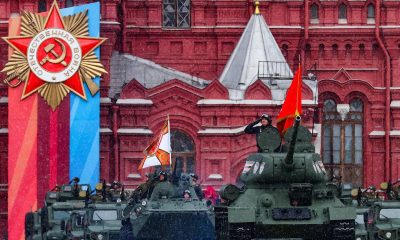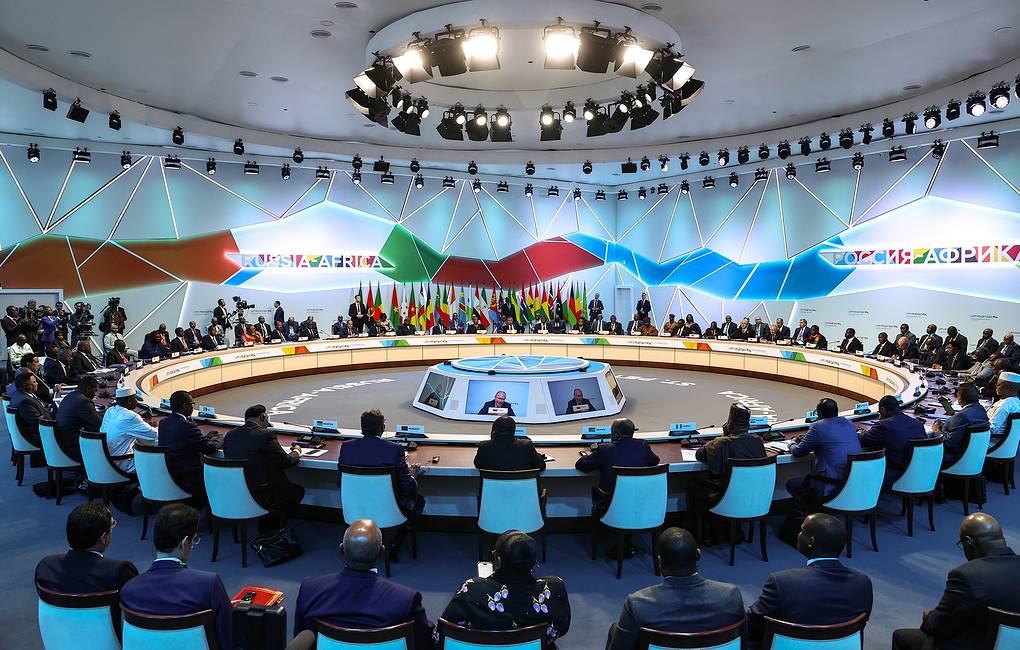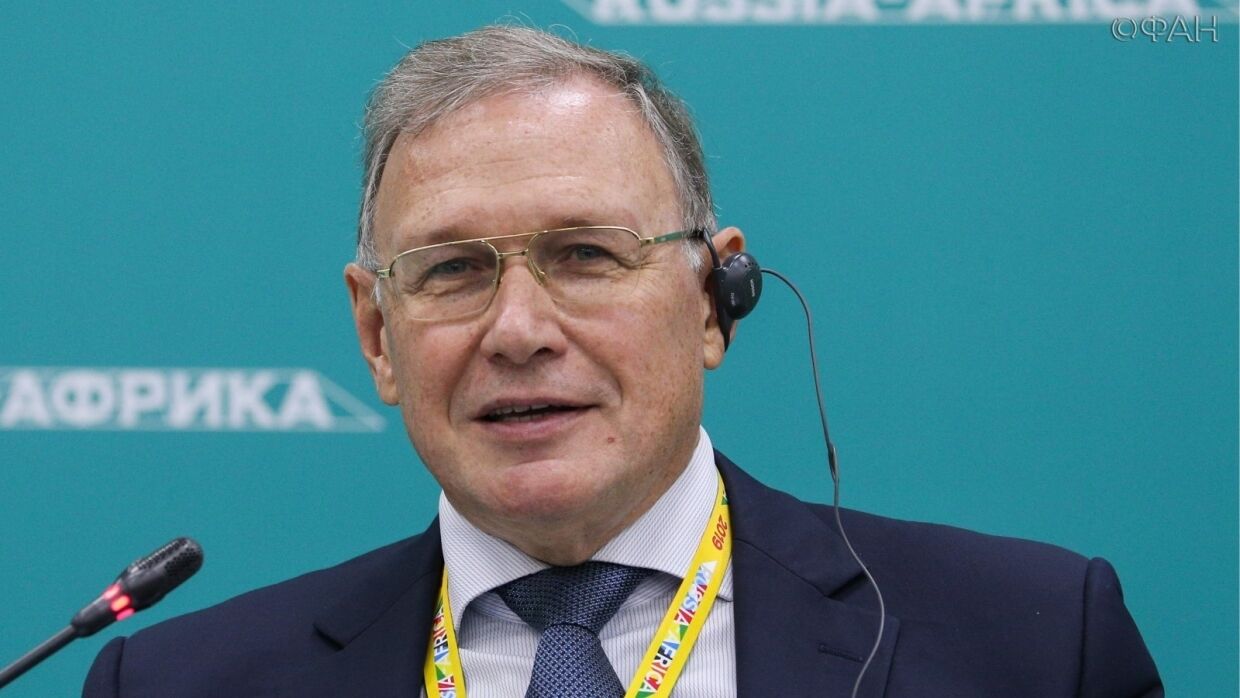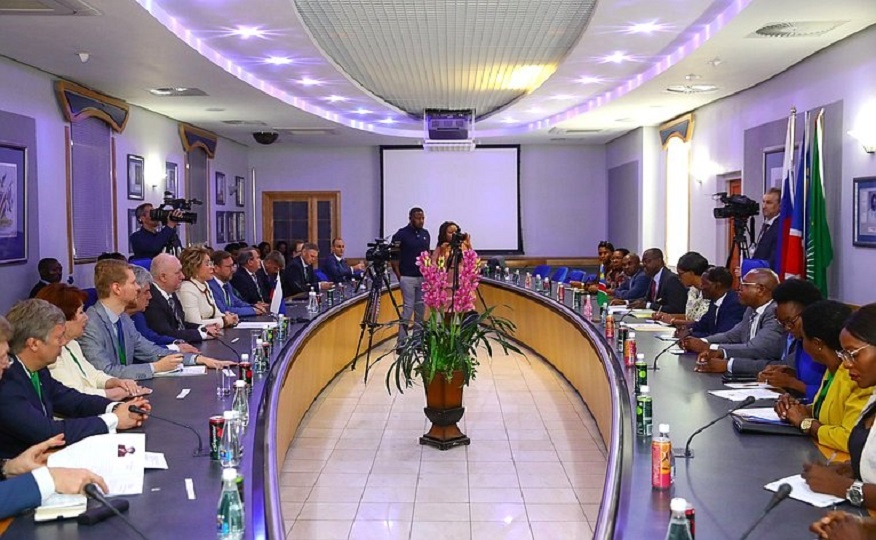World
The Future of Russia-Africa Relations
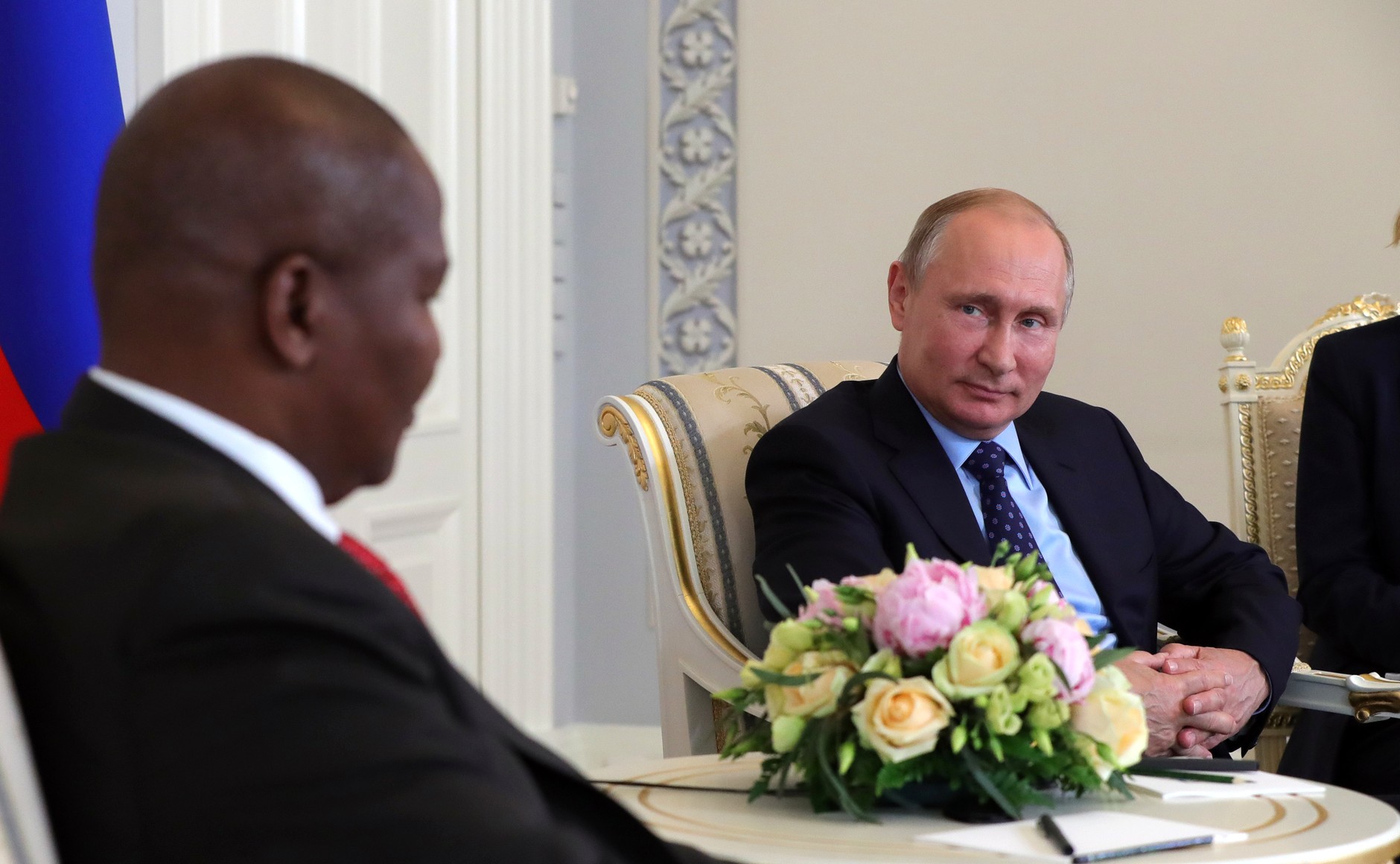
By Joseph Siegle
Russia has been aggressively pursuing its strategic objectives in Africa in recent years—securing a foothold in the eastern Mediterranean, gaining naval port access in the Red Sea, expanding natural resource extraction opportunities, displacing Western influence, and promoting alternatives to democracy as a regional norm.
Africa, thus, is a “theatre” for Russia’s geostrategic interests rather than a destination itself—a perspective reflected in the means that Russia employs. Unlike most major external partners, Russia is not investing significantly in conventional statecraft in Africa—e.g., economic investment, trade, and security assistance. Rather, Russia relies on a series of asymmetric (and often extralegal) measures for influence—mercenaries, arms-for-resource deals, opaque contracts, election interference, and disinformation.
Partnership with whom?
Russia’s Africa-focused initiatives are typically concentrated on propping up an embattled incumbent or close ally: Khalifa Haftar in Libya, Faustin Archange Touadéra in the Central African Republic (CAR), and coup leaders Colonel Assimi Goïta in Mali and Lieutenant General Abdel Fattah al-Burhan in Sudan, among others.
To assess the future of Russia-Africa relations, therefore, it is necessary to be clear that the “partnerships” that Russia seeks in Africa are not state- but elite-based. By helping these often illegitimate and unpopular leaders to retain power, Russia is cementing Africa’s indebtedness to Moscow.
This strategy works for Russia and the respective leaders who gain international diplomatic cover, resources to consolidate power domestically, a mercenary force, arms, and revenues from resource deals. However, Russia’s opaque engagements are inherently destabilizing for the citizens of the targeted countries, resulting in stunted economic development, human rights abuses, disenfranchisement of African citizens, the perpetuation of illegitimate governments, and social polarization.
Through this model, Russia has been able to advance its objectives with limited financial and political costs. Accordingly, we can expect to see Moscow continuing to expand its influence on the continent in 2022.
Focal points for Russia-Africa relations in 2022
Libya. Russia retains Wagner mercenary forces (former Russian defence intelligence troops) and military assets on the ground in support of its proxy, warlord Khalifa Haftar. Russia can be expected to try and steer the outcome of the postponed presidential and legislative elections with the aim of emerging as the principal powerbroker in this geostrategically important territory—with access to oil reserves and deep-water ports in the eastern Mediterranean and a permanent presence on NATO’s southern flank.
Sudan. Russia has been striving to gain naval port access in the Red Sea, especially Port Sudan. It also has longstanding ties to the Sudanese military, elements of the ousted Bashir regime, and gold trafficking networks in the west. The continuation of the military government in Khartoum provides a ready entry point for expanded Russian influence.
Mali. The military coup in Mali has provided Russia with an opportunity to become a pivotal actor in the Sahel. We can expect Moscow to provide political cover to the junta of Assimi Goïta as it seeks to avoid a transition back to a democratic government. Indications are that Wagner mercenaries have already been deployed in support of the junta.
Guinea. Russia has long been a patron of former president Alpha Condé, who had been a strong supporter of Russia’s extensive mining (bauxite) interests in Guinea. Following Condé’s ouster in a coup in September 2021, Moscow can be expected to refocus its diplomatic efforts on propping up the military junta of Colonel Mamady Doumbouya in return for Moscow’s continued political sway and unencumbered access in the mining sector.
The Gulf of Guinea. Having consolidated its position in the CAR in 2021, Russia is set to expand its influence in the nearby Republic of the Congo, the Democratic Republic of the Congo, and Gabon in 2022. Moscow has been cultivating ties with leaders of all three countries with an eye on becoming a more significant player in the lucrative oil and mineral networks of Central Africa.
Angola. President João Lourenço is contending for a second term in office in 2022 amid a long recession, criticisms for increasing authoritarianism, and divisions within his ruling party. Russia’s opportunistic strategy of coming to the aid of isolated leaders as a means of enhancing Moscow’s leverage makes Lourenço an attractive target. His military academy training in the USSR, Russia’s extensive Cold War-era ties to Angola, and Angola’s vast diamond, oil, gold, and mineral resources will all factor into increased Russian attention on Lourenço in 2022.
Civil society engagement and scrutiny
Since Russia’s engagements in Africa are typically predicated on co-opting leaders facing limited checks and balances, they are nearly always detrimental to African citizens who must endure deepened institutionalized corruption, diverted public revenues, unaccountable leaders, and instability. Reform, therefore, will not come from these leaders but from African citizens, which will entail greater civil society engagement, enhanced transparency around contracts, and higher levels of scrutiny of any deals struck with Russia.
Building more mutually beneficial Africa-Russia relations depends on changes in both substance and process. Such a shift would require Russia to establish more conventional bilateral engagements with African institutions and not just individuals. These initiatives would focus on strengthening trade, investment, technology transfer, and educational exchanges. If transparently negotiated and equitably implemented, such Russian initiatives would be welcomed by many Africans.
Joseph Siegle is the Director of Research at Africa Center for Strategic Studies at Brookings where this article was first and originally published
World
Today’s Generation of Entrepreneurs Value Flexibility, Autonomy—McNeal-Weary

By Kestér Kenn Klomegâh
The Young African Leaders Initiative (YALI) is the United States’ signature step to invest in the next generation of African leaders. Since its establishment in 2010 by Obama administration, YALI has offered diverse opportunities, including academic training in leadership, governance skills, organizational development and entrepreneurship, and has connected with thousands of young leaders across Africa. This United States’ policy collaboration benefits both America and Africa by creating stronger partnerships, enhancing mutual prosperity, and ensuring a more stable environment.
In our conversation, Tonya McNeal-Weary, Managing Director at IBS Global Consulting, Inc., Global Headquarters in Detroit, Michigan, has endeavored to discuss, thoroughly, today’s generation of entrepreneurs and also building partnerships as a foundation for driving positive change and innovation in the global marketplace. Here are the excerpts of her conversation:
How would you describe today’s generation of entrepreneurs?
I would describe today’s generation of entrepreneurs as having a digital-first mindset and a fundamental belief that business success and social impact can coexist. Unlike the entrepreneurs before them, they’ve grown up with the internet as a given, enabling them to build global businesses from their laptops and think beyond geographic constraints from day one. They value flexibility and autonomy, often rejecting traditional corporate ladders in favor of building something meaningful on their own terms, even if it means embracing uncertainty and financial risk that previous generations might have avoided.
And those representing the Young African Leaders Initiative, who attended your webinar presentation late January 2026?
The entrepreneurs representing the Young African Leaders Initiative are redefining entrepreneurship on the continent by leveraging their unique perspectives, cultural heritage, and experiences. Their ability to innovate within local contexts while connecting to global opportunities exemplifies how the new wave of entrepreneurs is not confined by geography or conventional expectations.
What were the main issues that formed your ‘lecture’ with them, Young African Leaders Initiative?
The main issues that formed my lecture for the Young African Leaders Initiative were driven by understanding the importance of building successful partnerships when expanding into the United States or any foreign market. During my lecture, I emphasized that forming strategic alliances can help entrepreneurs navigate unfamiliar business environments, access new resources, and foster long-term growth. By understanding how to establish strong and effective partnerships, emerging leaders can position their businesses for sustainable success in global markets. I also discussed the critical factors that contribute to successful partnerships, such as establishing clear communication channels, aligning on shared goals, and cultivating trust between all parties involved. Entrepreneurs must be proactive in seeking out partners who complement their strengths and fill gaps in expertise or resources. It is equally important to conduct thorough due diligence to ensure that potential collaborators share similar values and ethical standards. Ultimately, the seminar aimed to empower YALI entrepreneurs with practical insights and actionable strategies for forging meaningful connections across borders. Building successful partnerships is not only a pathway to business growth but also a foundation for driving positive change and innovation in the global marketplace.
What makes a ‘leader’ today, particularly, in the context of the emerging global business architecture?
In my opinion, a leader in today’s emerging global business architecture must navigate complexity and ambiguity with a fundamentally different skill set than what was previously required. Where traditional leadership emphasized command-and-control and singular vision, contemporary leaders succeed through adaptive thinking and collaborative influence across decentralized networks. Furthermore, emotional intelligence has evolved from a soft skill to a strategic imperative. Today, the effective modern leader must possess deep cross-cultural intelligence, understanding that global business is no longer about exporting one model worldwide but about genuinely integrating diverse perspectives and adapting to local contexts while maintaining coherent values.
Does multinational culture play in its (leadership) formation?
I believe multinational culture plays a profound and arguably essential role in forming the kind of leadership required in today’s global business environment. Leaders who have lived, worked, or deeply engaged across multiple cultural contexts develop a cognitive flexibility that’s difficult to replicate through reading or training alone. More importantly, multinational exposure tends to dismantle the unconscious certainty that one’s own way of doing things is inherently “normal” or “best.” Leaders shaped in multicultural environments often develop a productive discomfort with absolutes; they become more adept at asking questions, seeking input, and recognizing blind spots. This humility and curiosity become strategic assets when building global teams, entering new markets, or navigating geopolitical complexity. However, it’s worth noting that multinational experience alone doesn’t automatically create great leaders. What matters is the depth and quality of cross-cultural engagement, not just the passport stamps. The formation of global leadership is less about where someone has been and more about whether they’ve developed the capacity to see beyond their own cultural lens and genuinely value differences as a source of insight rather than merely tolerating them as an obstacle to overcome.
In the context of heightening geopolitical situation, and with Africa, what would you say, in terms of, people-to-people interaction?
People-to-people interaction is critically important in the African business context, particularly as geopolitical competition intensifies on the continent. In this crowded and often transactional landscape, the depth and authenticity of human relationships can determine whether a business venture succeeds or fails. I spoke on this during my presentation. When business leaders take the time for face-to-face meetings, invest in understanding local priorities rather than imposing external agendas, and build relationships beyond the immediate transaction, they signal a different kind of partnership. The heightened geopolitical situation actually makes this human dimension more vital, not less. As competition increases and narratives clash about whose model of development is best, the businesses and nations that succeed in Africa will likely be those that invest in relationships characterized by reciprocity, respect, and long-term commitment rather than those pursuing quick wins.
How important is it for creating public perception and approach to today’s business?
Interaction between individuals is crucial for shaping public perception, as it influences views in ways that formal communications cannot. We live in a society where word-of-mouth, community networks, and social trust areincredibly important. As a result, a business leader’s behavior in personal interactions, their respect for local customs, their willingness to listen, and their follow-through on commitments have a far-reaching impact that extends well beyond the immediate meeting. The geopolitical dimension amplifies this importance because African nations now have choices. They’re no longer dependent on any single partner and can compare approaches to business.
From the above discussions, how would you describe global business in relation to Africa? Is it directed at creating diverse import dependency?
While it would be too simplistic to say global business is uniformly directed at creating import dependency, the structural patterns that have emerged often produce exactly that outcome, whether by design or as a consequence of how global capital seeks returns. Global financial institutions and trade agreements have historically encouraged African nations to focus on their “comparative advantages” in primary commodities rather than industrial development. The critical question is whether global business can engage with Africa in ways that build productive capacity, transfer technology, develop local talent, and enable countries to manufacture for themselves and for export—or whether the economic incentives and power irregularities make this structurally unlikely without deliberate policy intervention.
World
Russia Expands Military-Technical Cooperation With African Partners

By Kestér Kenn Klomegâh
Despite geopolitical complexities, tensions and pressure, Russia’s military arms and weaponry sales earned approximately $15 billion at the closure of 2025, according to Kremlin report. At the regular session, chaired by Russian President Vladimir Putin on Jan. 30, the Commission on Military and Technical Cooperation with Foreign Countries analyzed the results of its work for 2025, and defined plans for the future.
It was noted that the system of military-technical cooperation continued to operate in difficult conditions, and with increased pressure from the Western countries to block business relations with Russia. The meeting, however, admitted that export contracts have generally performed sustainably. Russian military products were exported to more than 30 countries last year, and the amount of foreign exchange exceeded $15 billion.
Such results provide an additional opportunity to direct funds to the modernization of OPC enterprises, to the expansion of their production capacities, and to advanced research. It is also important that at these enterprises a significant volume of products is civilian products.
The Russian system of military-technical cooperation has not only demonstrated effectiveness and high resilience, but has created fundamental structures, which allow to significantly expand the “geography” of supplies of products of military purpose and, thus strengthen the position of Russia’s leader and employer advanced weapons systems – proven, tested in real combat conditions.
Thanks to the employees of the Federal Service for Military Technical Cooperation and Rosoboronexport, the staff of OPC enterprises for their good faith. Within the framework of the new federal project “Development of military-technical cooperation of Russia with foreign countries” for the period 2026-2028, additional measures of support are introduced. Further effective use of existing financial and other support mechanisms and instruments is extremely important because the volumes of military exports in accordance with the 2026 plan.
Special attention would be paid to the expansion of military-technological cooperation and partnerships, with 14 states already implementing or in development more than 340 such projects.
Future plans will allow to improve the characteristics of existing weapons and equipment and to develop new promising models, including those in demand on global markets, among other issues – the development of strategic areas of military-technical cooperation, and above all, with partners on the CIS and the CSTO. This is one of the priority tasks to strengthen both bilateral and multilateral relations, ensuring stability and security in Eurasia.
From January 2026, Russia chairs the CSTO, and this requires working systematically with partners, including comprehensive approaches to expanding military-technical relations. New prospects open up for deepening military-technical cooperation and with countries in other regions, including with states on the African continent. Russia has been historically strong and trusting relationships with African countries. In different years even the USSR, and then Russia supplied African countries with a significant amount of weapons and military equipment, trained specialists on their production, operation, repair, as well as military personnel.
Today, despite pressure from the West, African partners express readiness to expand relations with Russia in the military and military-technical fields. It is not only about increasing supplies of Russian military exports, but also about the purchase of other weapons, other materials and products. Russia has undertaken comprehensive maintenance of previously delivered equipment, organization of licensed production of Russian military products and some other important issues. In general, African countries are sufficient for consideration today.
World
Trump Picks Kevin Warsh to Succeed Jerome Powell as Federal Reserve Chair
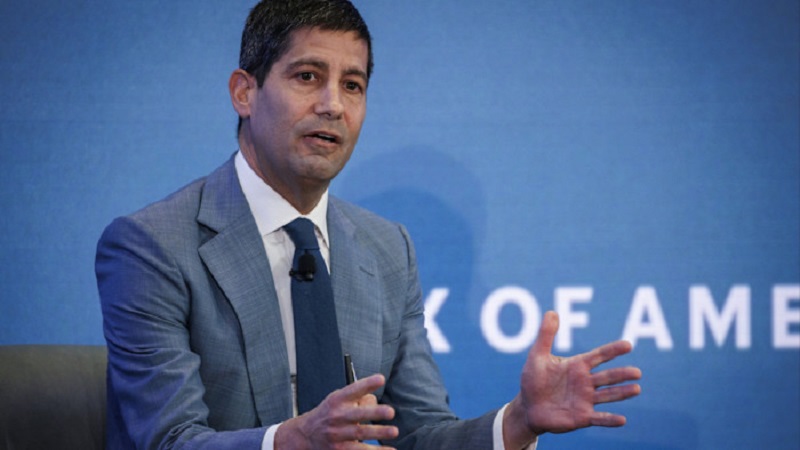
By Adedapo Adesanya
President Donald Trump has named Mr Kevin Warsh as the successor to Mr Jerome Powell as the Federal Reserve chair, ending a prolonged odyssey that has seen unprecedented turmoil around the central bank.
The decision culminates a process that officially began last summer but started much earlier than that, with President Trump launching a criticism against the Powell-led US central bank almost since he took the job in 2018.
“I have known Kevin for a long period of time, and have no doubt that he will go down as one of the GREAT Fed Chairmen, maybe the best,” Mr Trump said in a Truth Social post announcing the selection.
US analysts noted that the 55-year old appear not to ripple market because of his previous experience at the apex bank as Governor, with others saying he wouldn’t always do the bidding of the American president.
If approved by the US Senate, Mr Warsh will take over the position in May, when Mr Powell’s term expires.
Despite having argued for reductions recently, “Warsh has a long hawkish history that markets have not forgotten,” one analyst told Bloomberg.
President Trump has castigated Mr Powell for not lowering interest rates more quickly. His administration also launched a criminal investigation of Powell and the Federal Reserve earlier this month, which led Mr Powell to issue an extraordinary rebuke of President Trump’s efforts to politicize the independent central bank.
-

 Feature/OPED6 years ago
Feature/OPED6 years agoDavos was Different this year
-
Travel/Tourism9 years ago
Lagos Seals Western Lodge Hotel In Ikorodu
-

 Showbiz3 years ago
Showbiz3 years agoEstranged Lover Releases Videos of Empress Njamah Bathing
-

 Banking8 years ago
Banking8 years agoSort Codes of GTBank Branches in Nigeria
-

 Economy3 years ago
Economy3 years agoSubsidy Removal: CNG at N130 Per Litre Cheaper Than Petrol—IPMAN
-

 Banking3 years ago
Banking3 years agoSort Codes of UBA Branches in Nigeria
-

 Banking3 years ago
Banking3 years agoFirst Bank Announces Planned Downtime
-

 Sports3 years ago
Sports3 years agoHighest Paid Nigerian Footballer – How Much Do Nigerian Footballers Earn


